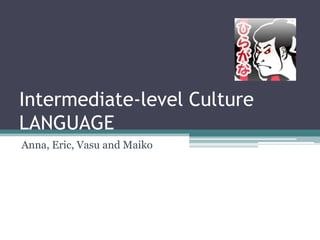Language cci
- 1. Intermediate-level Culture LANGUAGEAnna, Eric, Vasu and Maiko
- 2. Slang TermsBy: Eric Heidel
- 3. Def. for Slang and its UseSlang is the use of informal words that aren’t standard in one’s language. Who uses it?- Slang can be regionaloften particular to a certain subcultureWhy use it?- Humor- metaphors
- 4. Continued…Slangs differences in other culturesDifferent cultures use slang to shorten or cut off different parts of words.
- 5. Used everydayNormThe extent of slang- differs widely across…-Social,  ethnic, economic, and geographic section
- 6. Problems and Symbols of SlangSlang is symbolic -may be said to stand in an informal way for conventional ideasObject’s and namesProblems or conflicts with slangSlang is also used for terms that deal with…- violence, crimes drugs, and sex.
- 7. Tinglish
- 8. ‘Tinglish’It’s directly changing the words from a Thai sentence to English words, which results in English sentences with funny grammar.
- 9. ‘Tinglish’It’s the Thai’s adaptation to the increase in foreigner from tourism.SurfaceDeep Intermediate Tourism  Tinglish 
- 10. Possible ConflictsIt causes misunderstandings
- 12. Because it contains indirect context basedJapanese
- 13. High Context CultureHigh context culture (developed in homogeneous nations) read non verbal expression Values
- 14. Example of Conflict Could not do homework because could not go back home yesterday.I could not do my homework because I did not go back to home yesterday.
- 15. How to Use Personal Pronouns in Japanese?EnglishJapaneseFather  son/ daughter“Come and play tennis with me.”Son/ daughter  father“Come and play tennis with me.”Father  son/daughter“Come and play tennis with ‘papa’.”Son/daughter  father“Come and play tennis with me.”
- 16. Family Tree
- 17. Personal Pronouns1.Why is it intermediate level? It is language.2. Who shares it? Japanese people3. What does it mean?Shows status/ authority4. What deep level culture aspect could be its source?Cultural value of respect from Confucius 5.How might it cause conflict? Might cause misunderstanding between Japanese and foreigners
- 18. THANK YOU

















